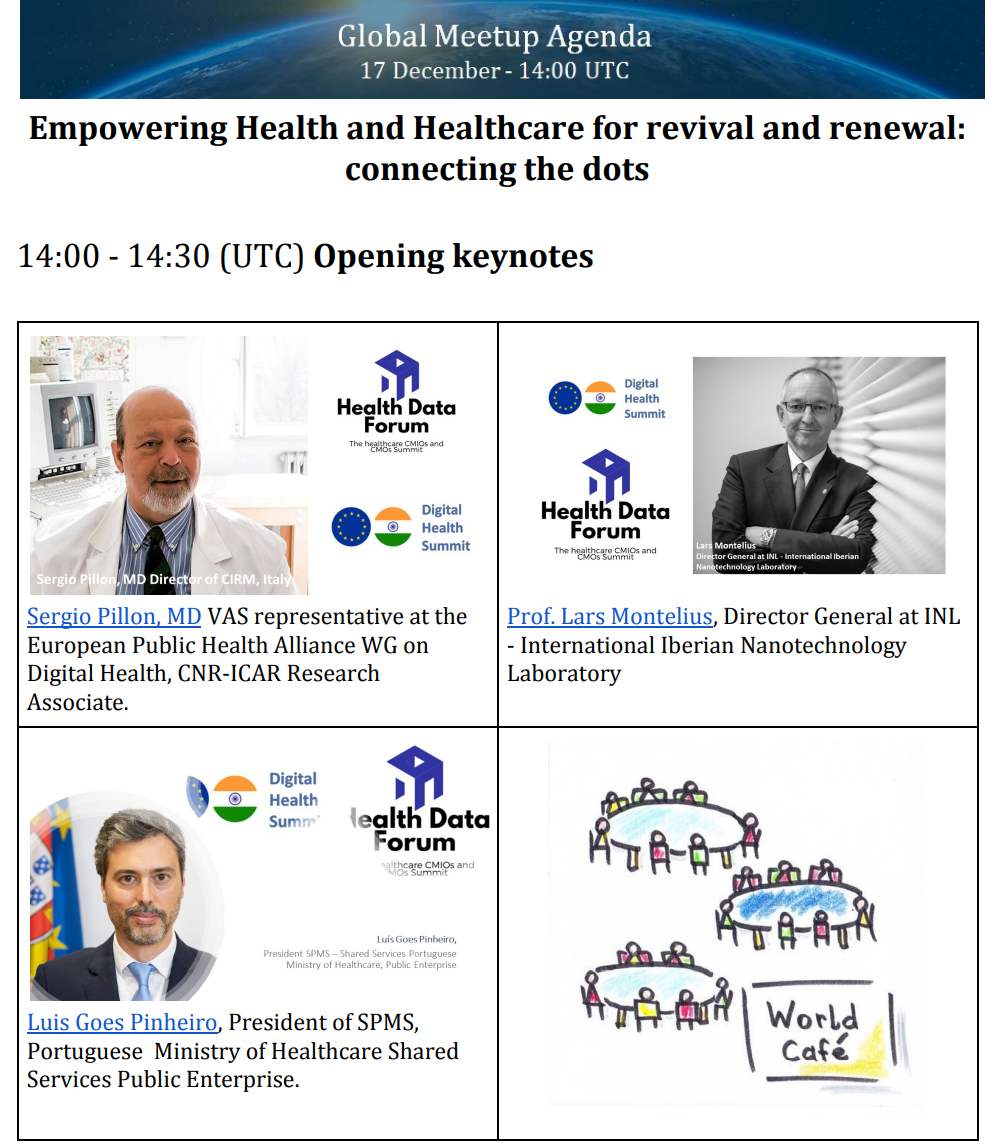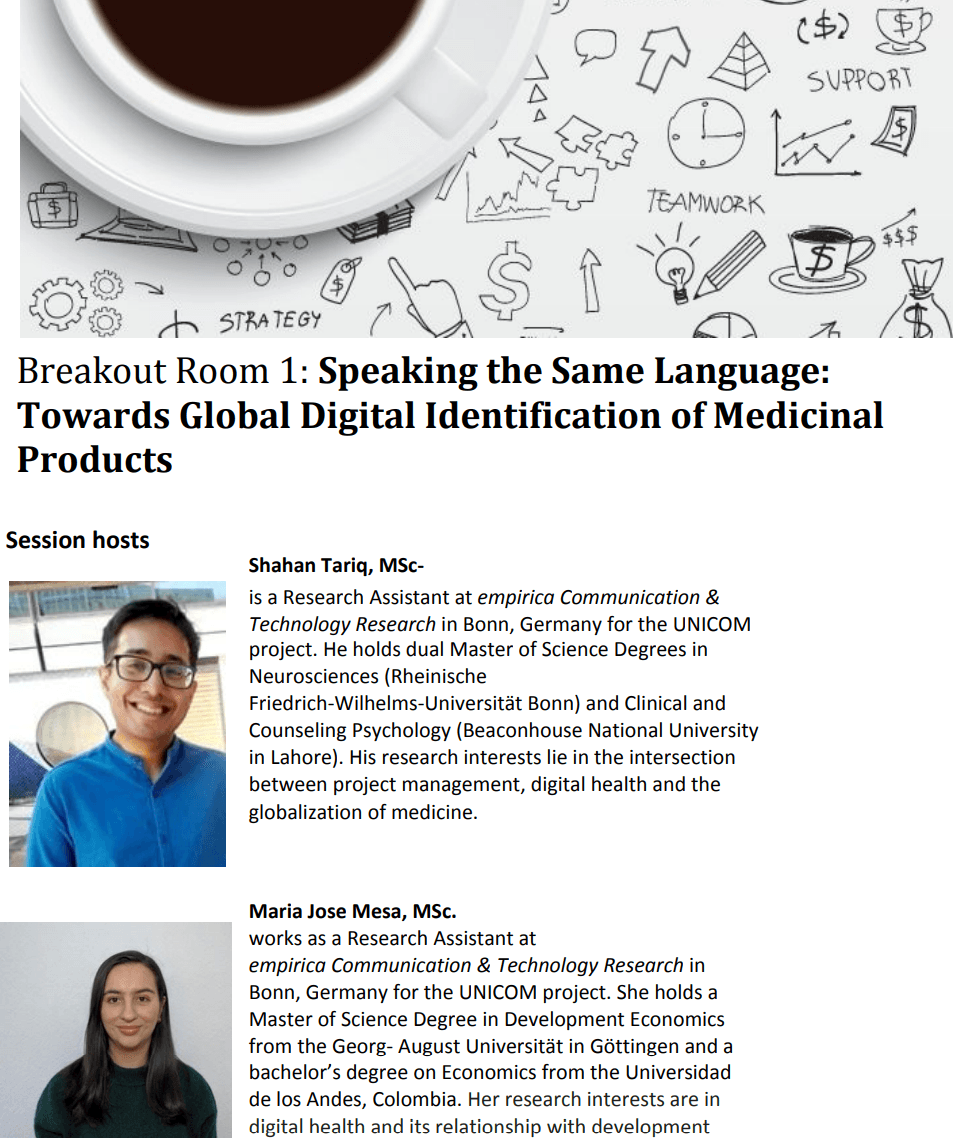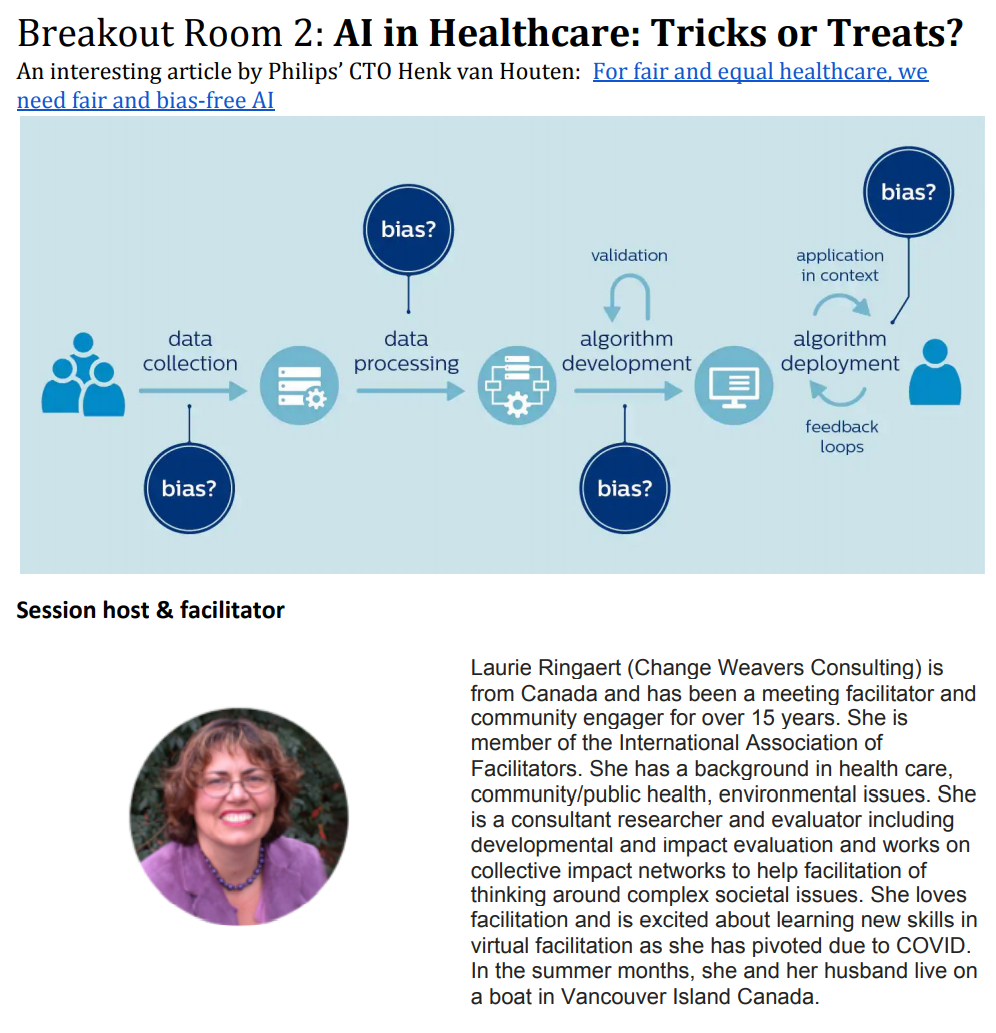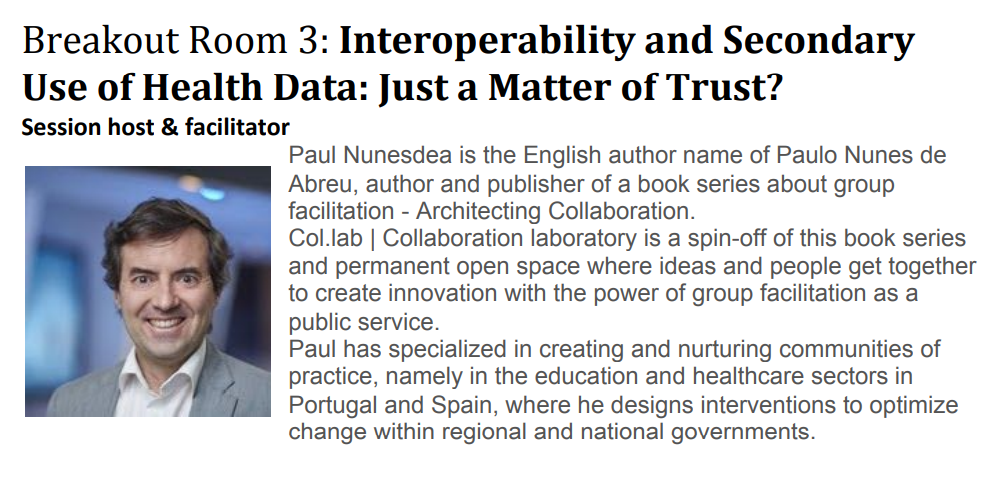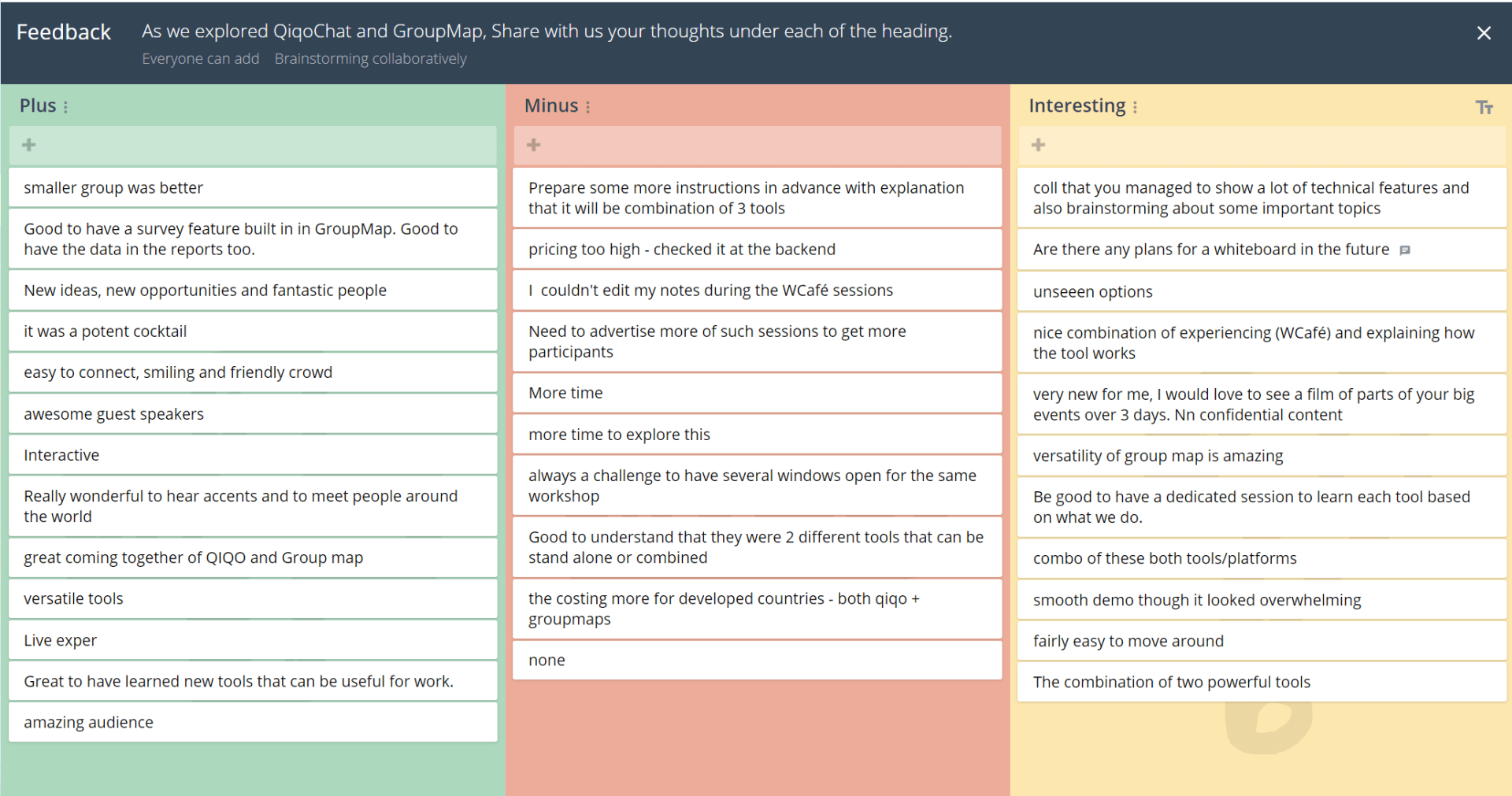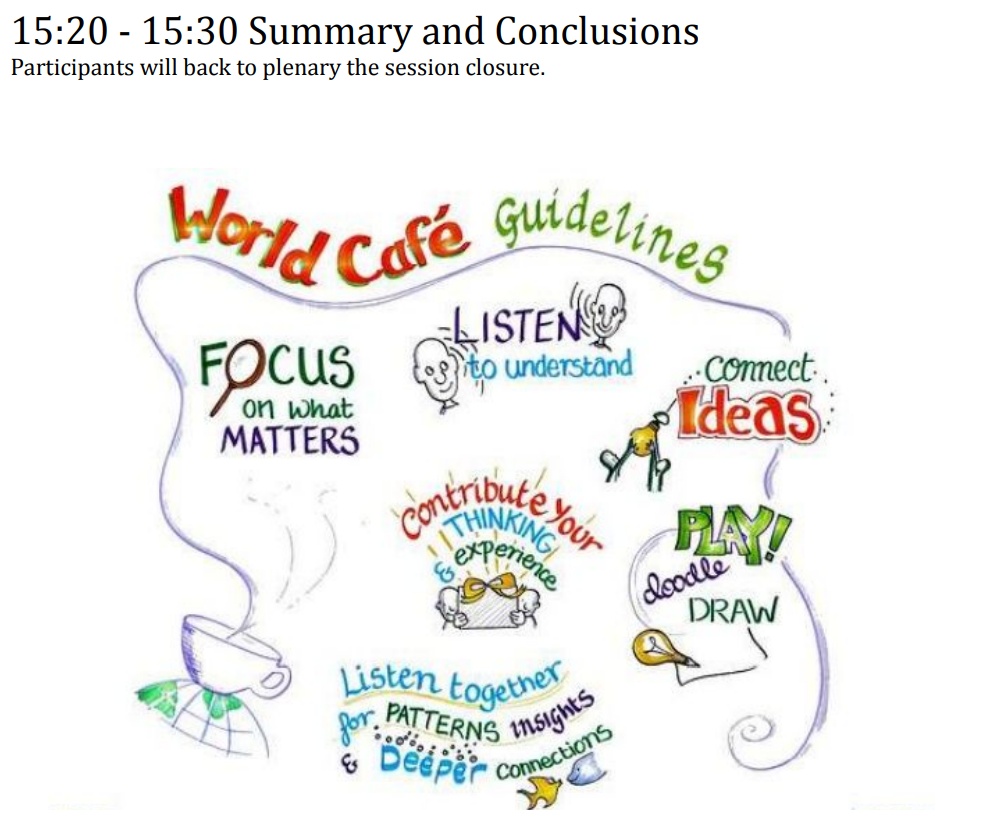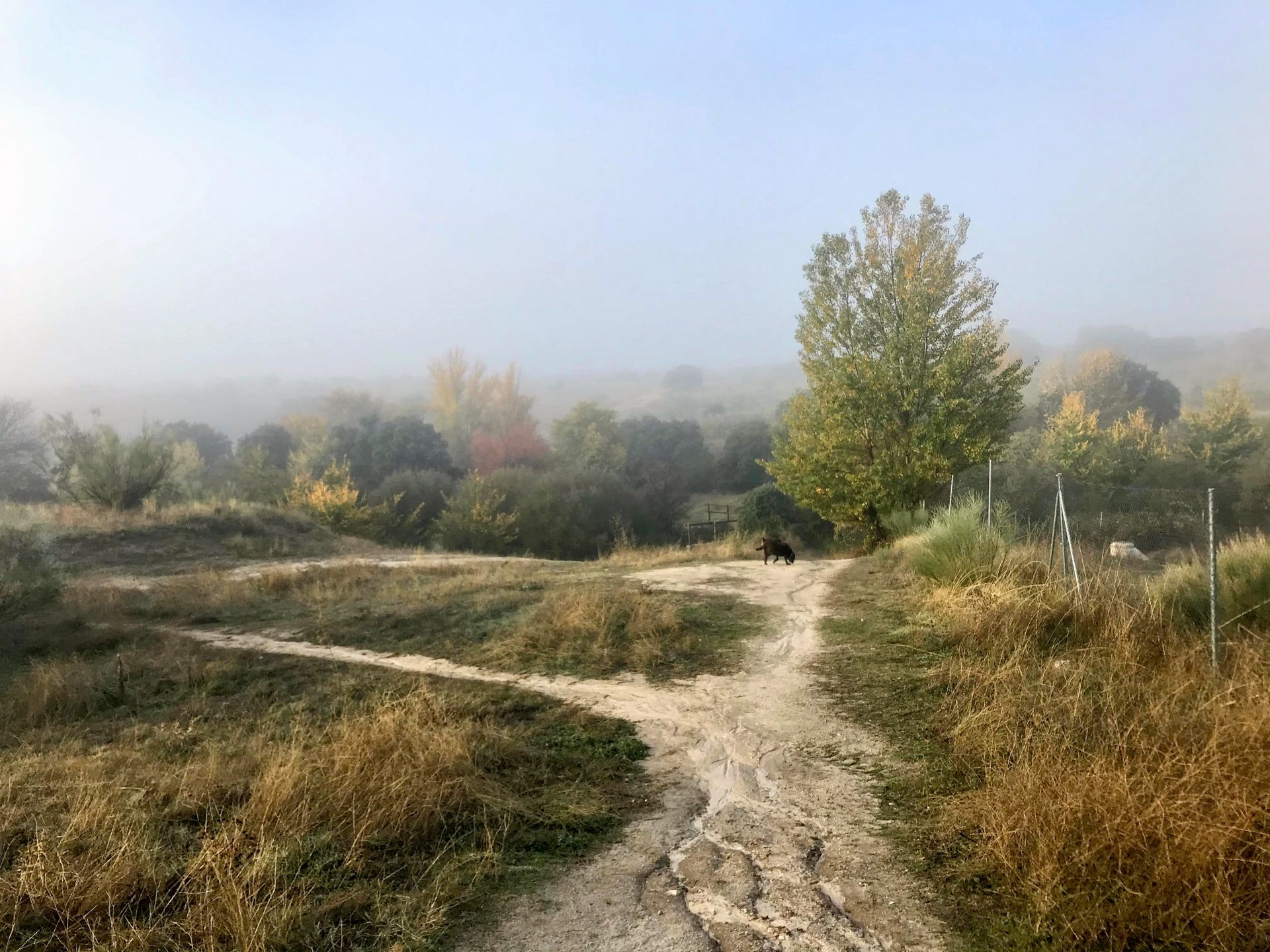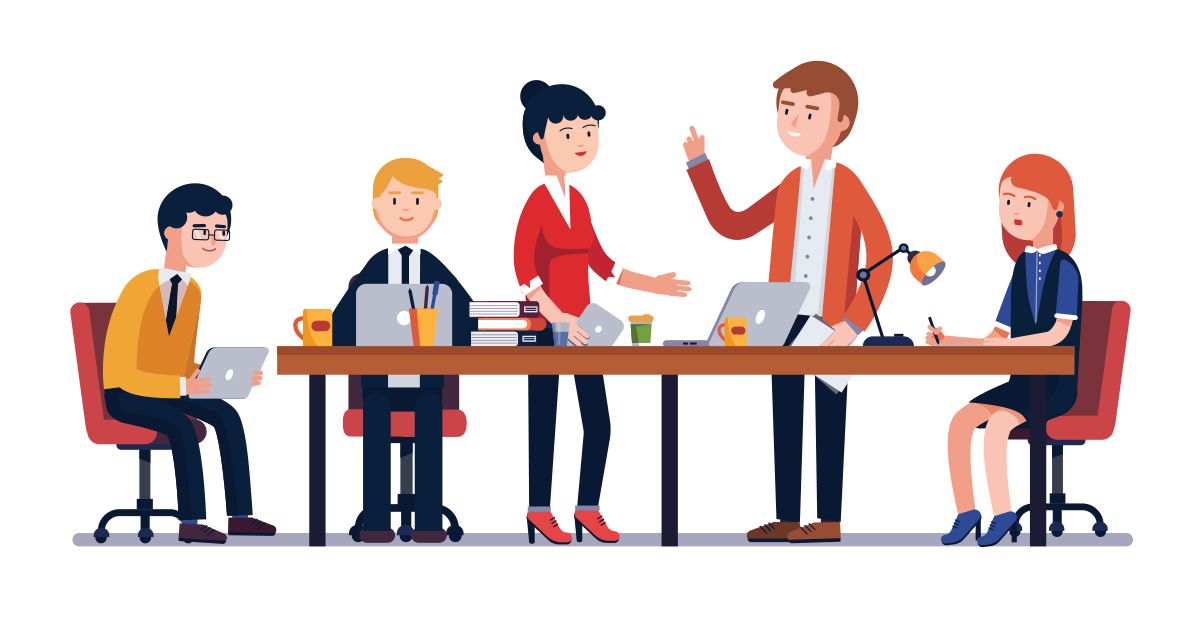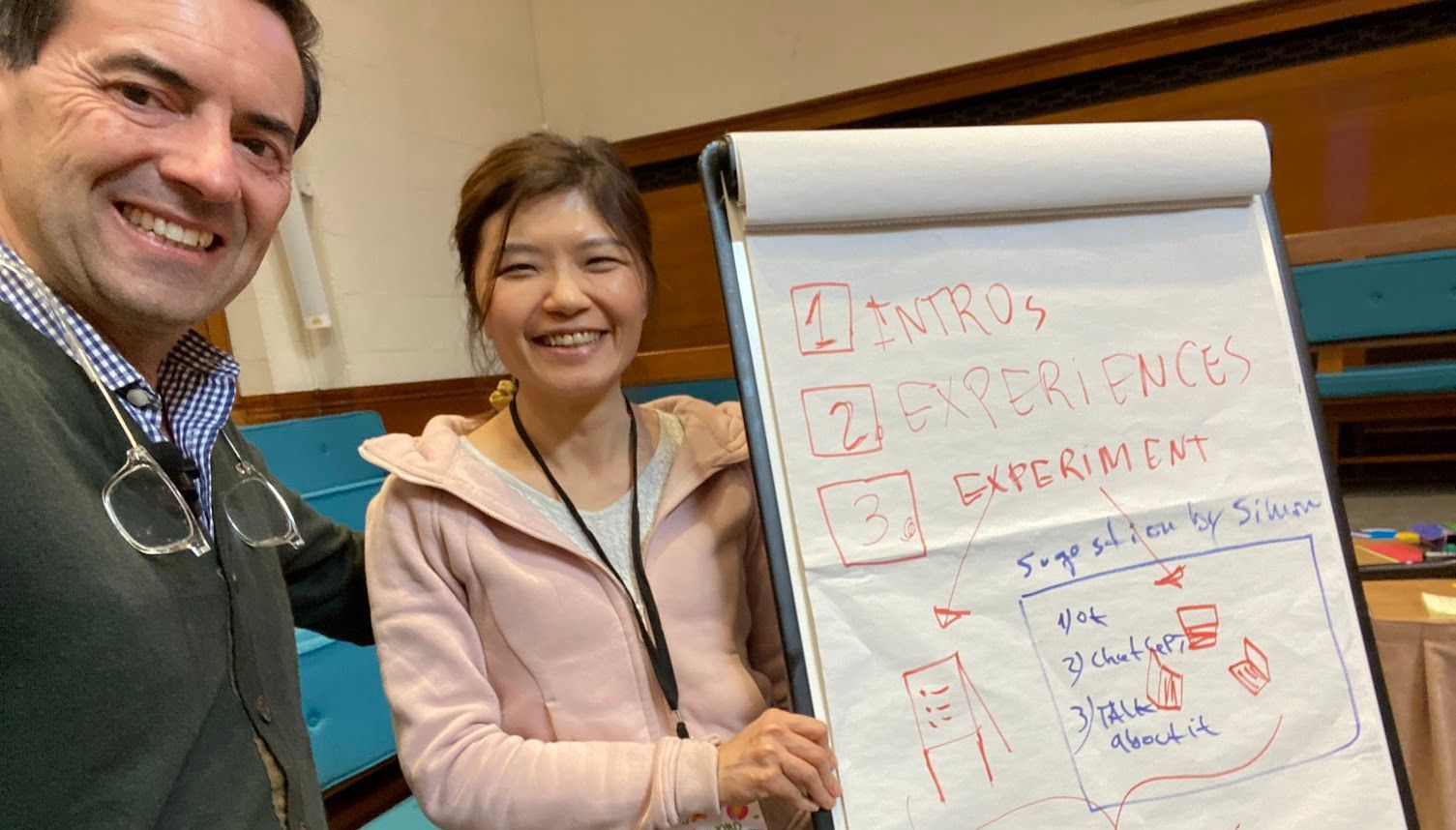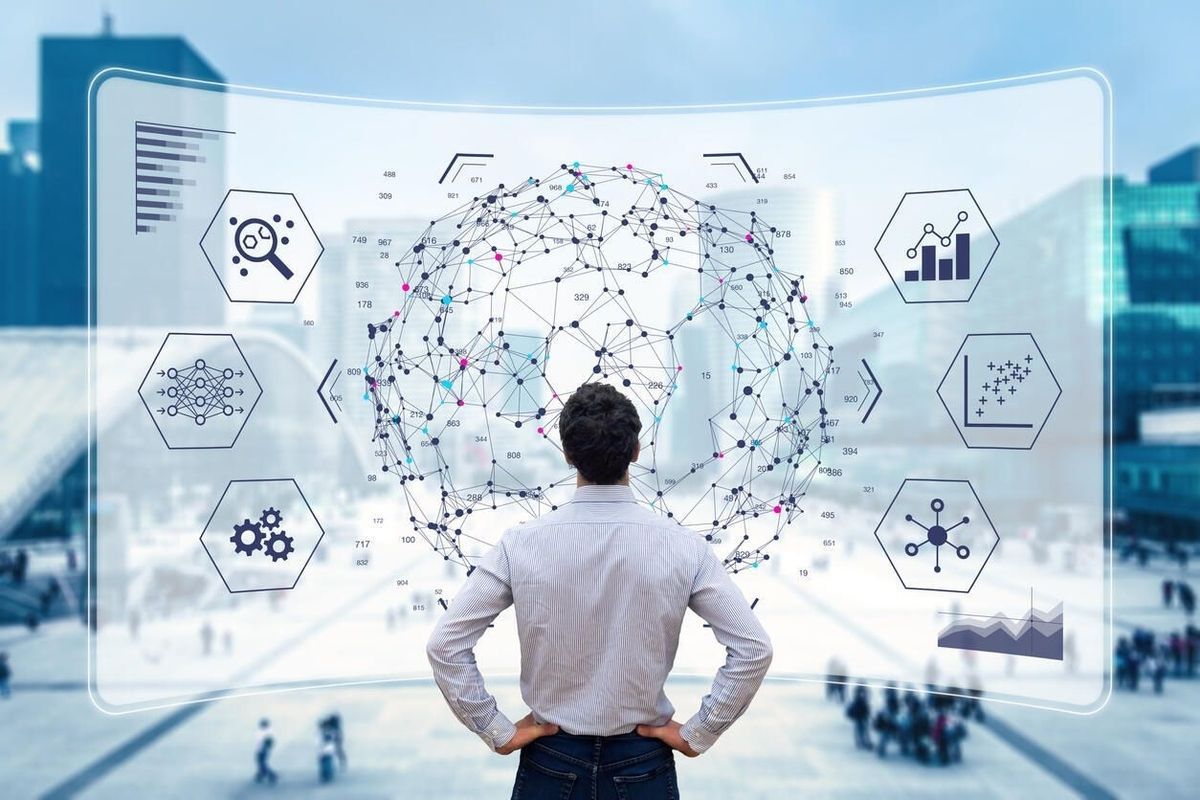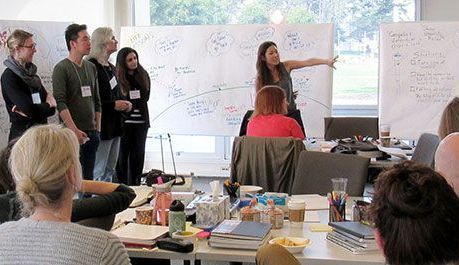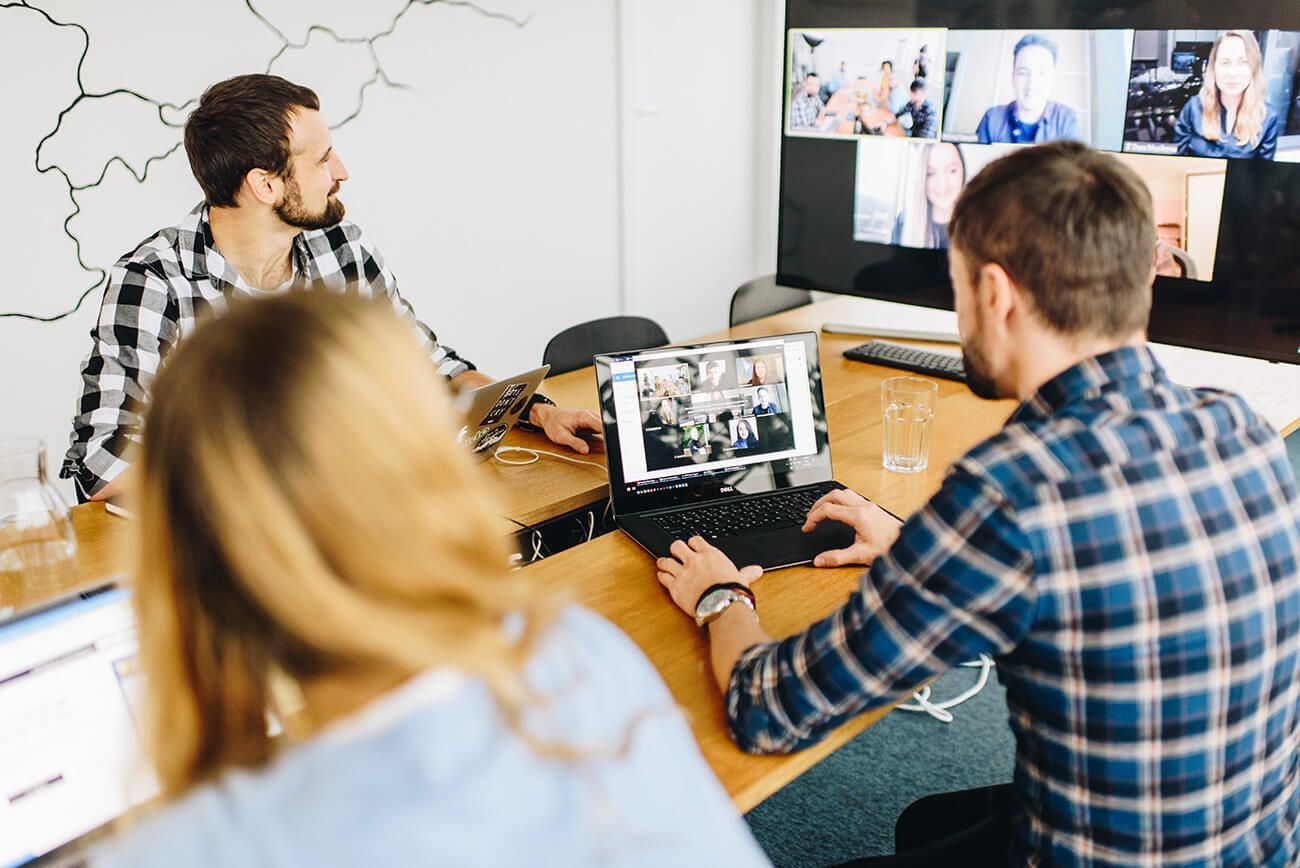Stepping outside your comfort zone
Exploring new methods for participant engagement in online meetings
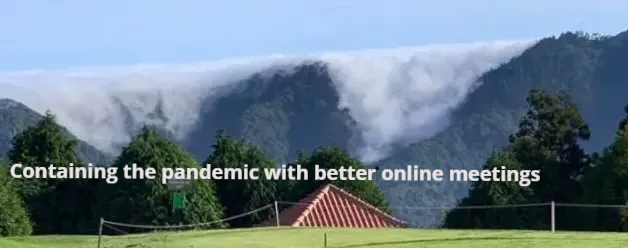
The comfort zone, as defined by Lifehacker in this great Huffpost article, is a "behavioural space where your activities and behaviours fit a routine and pattern that minimizes stress and risk".
Last month I was delighted to work and take risks together with a team of treasured colleagues including Laurie Ringaer (Principal Consultant at Change Weavers Consulting), Shahan Tariq and Maria Mesa (UNICOM research analysts from empirica) and the professional support of Lucas Cioffi (Founder of QiqoChat).
This short article describes the use of the World Café method with QiqoChat. Our goal was to create an online event where participants from a previous event (the Health Data Forum Global Hybrid Summit) could connect the dots between the different presentations and conversations that were hosted in a 3 days events.
This LinkedIn post describes more about our intentions and shares a PDF with the World Café meeting design principles. In spite of being conceived for face-to-face gatherings, there is absolutely nothing that prevents the successful application of this method in online meetings. We will share here some of the lessons learned.
The secret power of the immersive physical reality
When we talk about online meetings the vast majority of event hosts rather play safe and stick to the same protocols that caused 'the death by PowerPoint' in face-to-face meetings. The post-pandemic net result is that cyberspace is flooded with the same bad meeting experiences we had when we used to meet face to face, except that now we call it 'Zoom fatigue' due to a crucial unfair advantage.
Even in the worst event that occurs face-to-face participants are always able to take advantage of the coffee breaks, a powerful moment that is made possible by the fact that they all share the same immersive physical reality. No matter how bad and boring a meeting can be, participants in a physical event enjoy the 'coffee breaks experience' to connect and informally chat about the things that matter to them. Whereas in an online meeting coffee breaks are often lonely experiences (or just a way to engage with others not connected to the meeting you were attending).
Harrison Owen is a renowned book author that was one of the first to talk about the power of coffee breaks as a form of 'social technology'
In fact, when thinking about how to design a better meeting, Owen realised that the most highly valuable moment in the conferences he hosted was precisely the coffee breaks. So, why not design a meeting like a coffee break, where participants can talk about what makes them tick and really care about.
The meeting methodology Harrison Owen finally created is called Open Space Technology (OST) and the reasons for its successful application in such a range of diverse organizations as NASA, Agile software development companies, or in local churches, was explained by Keith McCandless who classified all possible meetings formats in two types: conventional and liberating.
OST is a striking example of a liberating structure that overcomes the biggest problems of conventional conferences and events because it flips the traditional conference format into a number of parallel sessions that anyone can propose to host and anyone is free to join. This meeting format empowers participants to decide what conversations they would like to join by selecting the sessions they most like to contribute. Likewise, the World Café is another exampe of a participant-led meeting format and we will expand more on this latter below.
QiqoChat the alternative for participant-driven online meetings
Whereas in a physical meeting you can create as many parallel sessions as there are different corners or breakout rooms in a large hotel or convention centre, in online meetings the situation is quite different. Conscious of this need, the founders of QiqoChat have devised a clever way for meeting hosts to escape the drain of conventional meetings and design online conferences with participant-driven 'liberating structures' such as the World Café or OST.
Lucas Cioffi refers to QiqoChat as a social wrapper around Zoom so that participants can move in and out of different Zoom meetings (each with their breakouts if desired) and explains "We created QiqoChat because we believed that existing online platforms were only scratching the surface of what was possible in terms of online collaboration and peer-to-peer engagement during live events."
Connecting the Dots: EU-India Digital Health Meetup & World Café
The goal of the Health Data Forum is to combine the different perspectives of data scientists, healthcare professionals, patients and governance to find the much-needed consensus for the next generation of healthcare systems. Join us and share your views and experience.
This Global Meetup was an afterburner event from the Global Hybrid Summit last 28-30 October in preparation of the inaugural EU-India Digital Health Summit 2021 that will bring together key stakeholders from Government, Statutory Bodies, Healthcare Providers, Payers, Life Sciences, Medical Device, Digital Health and solution providers for path-breaking collaborative discussions on Digital Health issues, best practices and the latest in tools & technologies that will drive and enhance the new-age healthcare delivery and outcomes.
The World Café is a conversational method in which small groups of people come together to have open, creative conversations on a topic of mutual interest, to surface their collective knowledge, to share ideas and to gain a deeper understanding of the issues involved and it can also be hosted online.
We thought that this would be an appropriate method for our purpose and we have created 3 breakout room in QiqoChat each with a specific conversation topic, united to the overarching theme: Empowering Health and Healthcare for revival and renewal: connecting the dots.
An online conference vs. an online workshop
When designing this meeting structure we deliberately wanted to depart from the conventional conference format where participants stay in the main room and the sole interaction that occurs is the one that may be generated by questions posed in the chat to be answered by the guest speakers.
By using the World Café methodology we deliberately took the risk to flip the conference into 3 separate 'virtual tables' that could be hosted as parallel workshops.
According to the dictionary, a workshop is a meeting at which a group of people engage in intensive discussion and activity on a particular subject or project.
Workshops are different than meetings because they are designed to be a trusted and open space where everyone can express themselves as if they were among close friends. Yet the focus of the conversation is designed to address work issues that are normally never properly addressed in meetings and less so in traditional conferences with the conventional 'sage on stage' format.
In a workshop, the kind of group interactions that are designed by the workshop leader (or facilitator) is aimed at generating dialogue - a special kind of conversations where everybody actively listens to what everyone else has to say (more here).
Risks worth taking
According to the HuffPost article by Carolyn Gregoire that I mentioned above, we are naturally wired to seek comfort so it's only natural that we struggle any time we step outside our comfort zones. However, the author points out, there are 3 important reasons why we should take new challenges: to help us grow, to be more creative and to help us age better. As Carolyn noted, a 2013 study found that learning new and demanding life skills can help us stay mentally sharp throughout our entire life span.
I am sure that Laurie, Shahan and Maria will be forever young as this meeting format was something they had never tried before, yet, wholeheartedly, embraced the challenge of combining QiqoChat and GroupMap™ in a World Café meeting event.
GroupMap™ is a real-time online brainstorming tool for workshops and meeting events. You can have a look at the virtual space we used here.
I had previously tested this configuration in an IAF Tech Level Up event that I co-hosted earlier, IAF Tech Level Up Video Conference Bonanza & Cocktail Party and the evaluation results were surprisingly good (see image below). So, I was confident that we could achieve equally good results in this Global Meetup.
According to David Birss, the success of a workshop is directly proportional to the amount of thought and preparation that is made in advance and this is equally important in both face to face and online workshops.
In one of his courses that I strongly recommend, David observes 5 key elements everyone should consider when planning a workshop: Why, Who, Where, When and What. Let's review them here.
The 'Why' for this Global Meetup was to provide an opportunity to guest speakers and participants to consolidate and connect the dots among the different presentations that were offered.
The 'Who' was all the guest speakers and participants from the Health Data Forum Global Summit.
'When' and 'Where', these pertain to the meeting logistics, and we hosted this 8 weeks after the event and in the same QiqoChat platform.
'What' refers to the expected outcome of the workshop and in this case, this triggered the decision to use GroupMap to collect the participants' ideas that were generated in each of three 'discussion stations' that were created.
Of course, we could also have used a shared Word document or Google Suite presentation mounted in each of the QiqoChat breakout rooms for the same purpose. However, GroupMap allows an extra level of process design in each of the 'debate stations', namely the quick vote of the most relevant topics that would then be imported into a summary map at the end of the session.
Containing the pandemic with better online meetings
As the picture on top of this article conveys, containing the virus expansion (symbolized by the clouds) and keeping as many disease-free areas as possible in our planet is a difficult but not impossible mission. Whilst global vaccination and social distance have a role to play, hosting more engaging online meetings can be a major contribution toward this collective mission. This is only possible if virtual meeting hosts are willing to take risks and exploring new methods for participant engagement in online meetings.
The Health Data Forum Global Hybrid Summit fulfilled this mission. Despite having live broadcasts from an empty auditorium, we had the satisfaction of creating a safe social environment where participants could watch informative presentations such as the Global Keynote from David Novillo Ortiz, Head of Unit, Health Data & Information, WHO Europe, and hosted a range of in-depth conversations from Day 1, to Day 3.
This subsequent World Café was designed to accomplish the same mission whilst maximizing the benefits of face-to-face interactions with digital tools for augmented collaboration such as this powerful combination of QiqoChat and GroupMap™.
Closing the Loop: Lessons Learned
The best way to benefit from risk-taking and to host better online meetings is simply to close the learning loop and conduct an after-action review conversation with all involved. Here are a couple of points we generated from our latest experience:
- Check the relevance of discussion stations in advance
This can be done by sending a survey in advance to enquire participants about the key discussions that they have missed from the previous event and that would be willing to contribute in the follow-up meeting.
- Breakout rehearsals
Before the start of the session, we could have employed your time to rehearse the hosts' configurations with GroupMap and final arrangements needed.
- Onboarding video
Before the start of the event, send a short video to all participants with an explanation about the virtual space and how it is organized (see here an example with a different platform used for a training workshop).
- Clear navigation instructions
At the start of the meeting do a navigation tour on the virtual space that is going to be used. This can be like the flight crew instructions briefing when we are on board of the plane.
- Tech angel always available
In the onboarding briefing, introduce the tech angel that will be available to support any doubts participants may have and how to reach him over phone or WhatsApp.
- Assign participants to each breakout
When the world café starts you should have a previously defined list of participants per room and the 'event majordomo' should stay in the main room for anyone joining later.
- Balance less time for guest keynotes
We could have assigned less time for the opening keynotes in order not to squeeze the time for discussions in the breakouts and have the full 3 rounds instead of just 2.
- Flip guest keynotes
We could have started with the World Café and then invite the guest speakers to present at the closing session, inspired by the conclusions of the debates.
All in all, my co-hosts did not found any major drawbacks in the combination the virtual space of QiqoChat and GroupMap except, of course, that we all realise the extra effort required for making all participants acquainted and comfortable with the structure proposed and the virtual space selected for this event.
Was this risk worth it? In our own subjective experience we liked the meeting and the outcomes achieved. The next article with the results from the survey to all participants will be complementing this evaluation.
About the author
Paul Nunesdea is the English pen name of Paulo Nunes de Abreu, Facilitator, Master of Ceremonies, Author, and Publisher of the book series - Architecting Collaboration, his LinkedIn profile can be reached here, or in Spanish here, or Portuguese here.
Paul is an IAF Certified Facilitator™ who designs and hosts events for clients ranging from large companies to municipalities and regional governments.
His academic background as a PhD researcher combined with +15 years of experience as a former CEO and entrepreneur has sharpened a client-serving mentality eager to co-create win-win solutions. As an NGO founder, he co-founded Digital Health Portugal and hosts the Health Regions Summit, the Health Data Forum among other initiatives.
As both a GroupMap™ and Howspace™ certified facilitator he co-founded the Digital Collaboration Academy with renowned facilitator Peter Seah united by the vision of creating and sustaining a new emerging field -
Digital Facilitation - augmented by the core competencies of the IAF - International Association of Facilitators.
Follow Us
"Be brave enough to start conversations that matter and shift the direction of change for the better."
col.lab | collaboration laboratory is a spin-off from the book series " Architecting Collaboration " and our privacy policy can be consulted here
My Meeting Support is an event services brand by col.lab | collaboration laboratory






